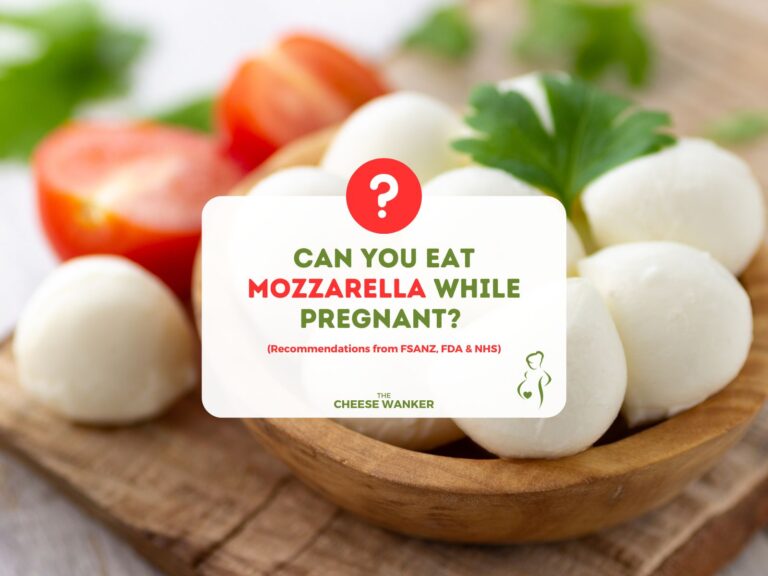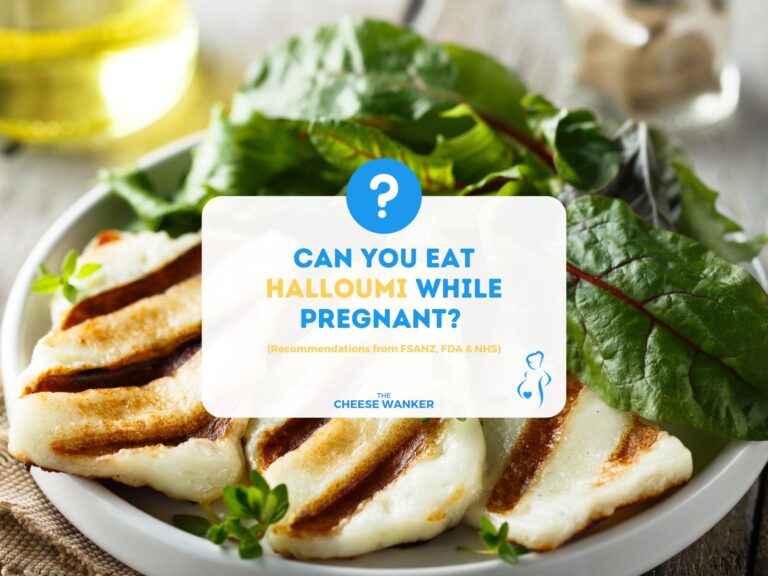Pregnancy comes with its share of dietary considerations, and for cheese lovers, the question of Parmesan’s safety often looms large. In this blog post, we explore the delectable world of Parmesan to answer the pressing question: Can expectant mothers safely eat Parmesan cheese during pregnancy? Join us as we unravel the facts about Parmesan, blending nutrition, safety and the joy of culinary indulgence during these transformative nine months.
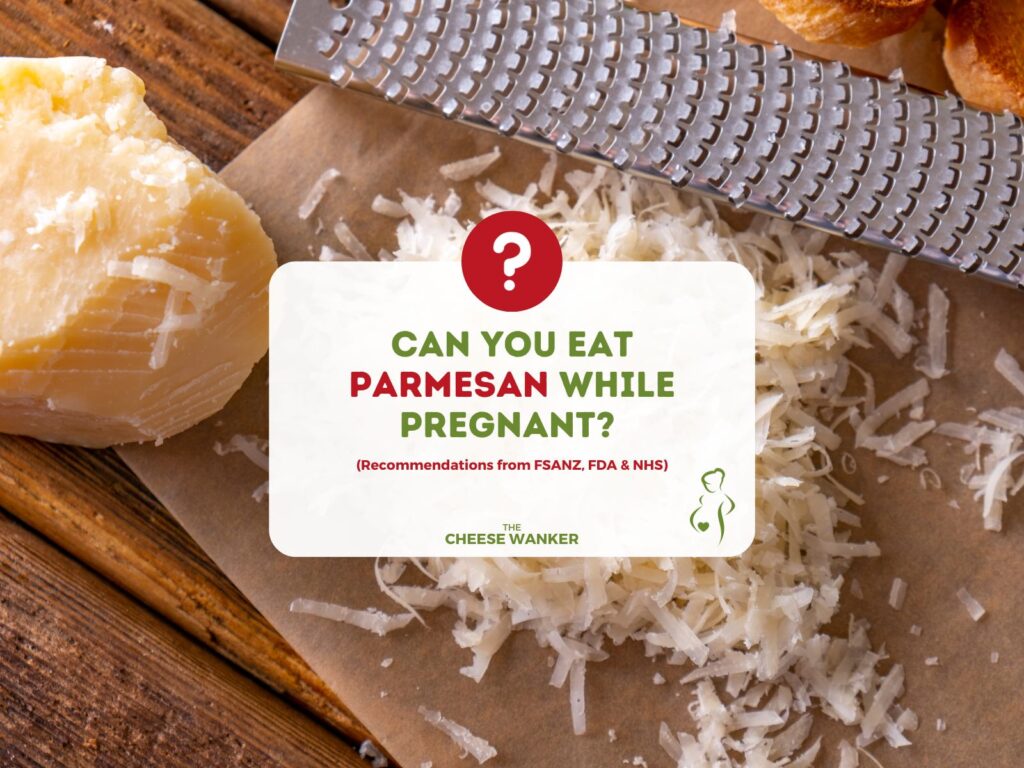
SEE ALSO: Our complete guide to which cheeses you can eat during pregnancy →
The basics of pregnancy nutrition
During pregnancy, maintaining a well-balanced and nourishing diet is essential for the health and development of both the mother and the growing foetus. Optimal nutrients play a vital role as the foundational building blocks for the baby’s organs, bones and overall growth.
At the same time, these nutrients support the mother’s changing body and help meet her energy requirements.
You can read more about the specific dietary needs of a pregnant woman in this article here.
Should pregnant women eat cheese?
Incorporating cheese into the diet of a pregnant woman can offer valuable nutrition, providing essential nutrients crucial for both maternal and foetal well-being.
Renowned for its calcium content, cheese plays a pivotal role in the development of the baby’s bones and teeth. Additionally, it serves as a rich source of high-quality protein, supporting the growth of the placenta and the baby’s tissues.
Certain cheeses, enriched with vitamin D, not only enhance calcium absorption but also contribute to promoting skeletal health. Beyond calcium, cheese contributes to a well-rounded diet by supplying key nutrients such as phosphorus, B vitamins and zinc.
These nutritional benefits make cheese a convenient and versatile option for pregnant women, addressing their changing nutritional needs and ensuring a diverse array of essential elements for a healthy pregnancy.
Can pregnant women eat all types of cheese?
Pregnant women are generally advised to approach cheese consumption with caution, as certain types pose a higher risk of potential contamination with harmful bacteria, such as Listeria.
Soft cheeses with high moisture content, including Brie and Camembert, as well as lower-acidity blue cheeses like Stilton and Roquefort, may present an increased risk.
Additionally, unaged cheeses like Feta, Halloumi and Mozzarella should be avoided if made with unpasteurised milk, as they also carry a higher risk of contamination.
To ensure the safety of cheese consumption during pregnancy, it’s crucial for expectant mothers to scrutinise labels for pasteurisation information. And adhere to good food hygiene practices.
What type of cheese of Parmesan?
Parmesan is a hard, granular cheese that originated in Italy. It is typically made from cow’s milk and has a fruity savoury flavour.
Parmesan is renowned for its grainy texture and is often aged for an extended period, contributing to its rich and robust taste. As a result of its texture, Parmesan can be broken into shards or chunks, or even grated.
This Italian cheese is widely used in cooking and is a key ingredient in dishes like pasta, salads and risottos.
Is Parmesan made with raw or pasteurised milk?
Parmesan is a commercial cheese inspired by the traditional King of Italian cheeses, Parmigiano Reggiano. While the latter is always made with raw milk, Parmesan is usually made with pasteurised milk.
Since it is most often a mass-produced cheese, pasteurised milk provides a cheaper and more convenient option. Having said that, you might still come across some raw milk versions of Parmesan.
Parmigiano Reggiano is a protected cheese in Italy and Europe. And each wheel of this pressed cheese has to meet stringent standards to bear the name. As a result, any wheels that fail to pass the test can be sold locally or exported under a different name. And, you’ve guessed it, that name is Parmigiano or Parmesan.
Can pregnant women eat Parmesan?
Parmesan is generally considered safe for consumption during pregnancy according to health authorities worldwide. But there are some considerations to keep in mind.
Pasteurised Parmesan
As mentioned above, most versions of this hugely popular cheese are made with pasteurised milk. As such, health authorities around the world consider them to be safe for pregnant women.
Raw milk Parmesan
While unaged raw milk cheeses are at a higher risk of contamination, raw milk Parmesan is also considered safe for pregnant women. As a matter of fact, FSANZ in Australia and New Zealand consider aged raw milk cheeses to have an equivalent safety profile in pregnancy to pasteurised ones.
The reason for this is the low moisture content and relatively high salt content. We’ll get back to this a little bit later in our nutritional assessment.
Nutritional benefits of Parmesan
Parmesan cheese, renowned for its rich and robust flavour, offers a range of nutritional benefits that make it a valuable addition to a balanced diet.
Here’s a closer look at the positive aspects, with a mindful note on salt levels.
Packed with protein (25 g)
Parmesan is a potent source of high-quality protein, essential for the growth and repair of tissues in the body. For expectant mothers, ensuring an adequate protein intake is crucial, and Parmesan provides a savoury and versatile way to meet this nutritional requirement.
Bone health support (1184 mg of calcium)
Furthermore, with its substantial calcium content, Parmesan plays a pivotal role in supporting the development of strong and healthy bones. This is especially vital during pregnancy, contributing to the formation of the baby’s skeletal structure and teeth.
Essential nutrients
Beyond protein and calcium, Parmesan delivers an array of essential nutrients such as phosphorus, B vitamins and zinc. These micronutrients play diverse roles, from energy metabolism to immune function, contributing to overall health and well-being.
A word of caution on salt levels (1175 mg of sodium)
While Parmesan boasts impressive nutritional credentials, it’s important to be mindful of its salt content. Parmesan is naturally high in salt, which can contribute to increased sodium intake. Excessive sodium intake is associated with potential health risks, including elevated blood pressure.
For individuals monitoring their sodium intake, such as those with hypertension or certain cardiovascular conditions, it’s advisable to enjoy Parmesan in moderation.
You can find our comprehensive assessment of the nutrition profile of Parmesan in this post here.
Pregnancy-friendly recipes using Parmesan cheese
Since pregnant women can safely eat Parmesan, it is no surprise that they can also use it in cooking. Here are three pregnancy-friendly recipes using Parmesan that are not only delicious but also packed with essential nutrients for expectant mothers.
Parmesan-Crusted Salmon with Lemon Dill Sauce
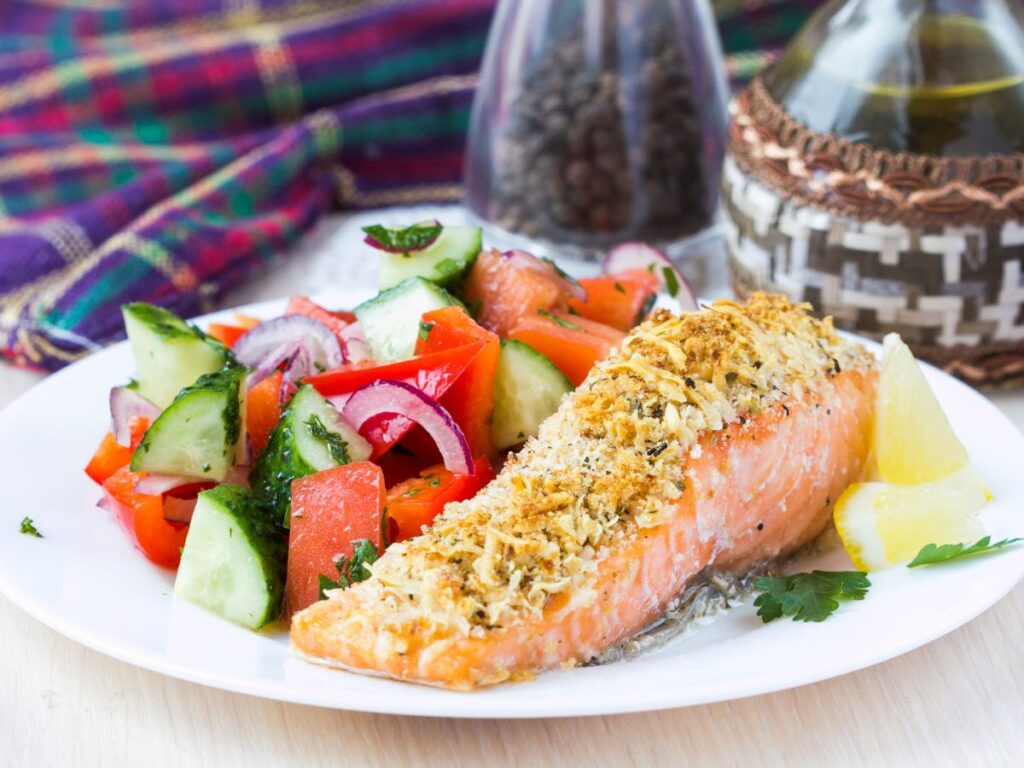
Coat succulent salmon fillets in a Parmesan crust and baked them to perfection. You can serve this with a fresh salad and a zesty lemon dill sauce. This omega-3 rich, protein-packed dish is perfect for a healthy pregnancy.
Creamy Parmesan Risotto with Asparagus
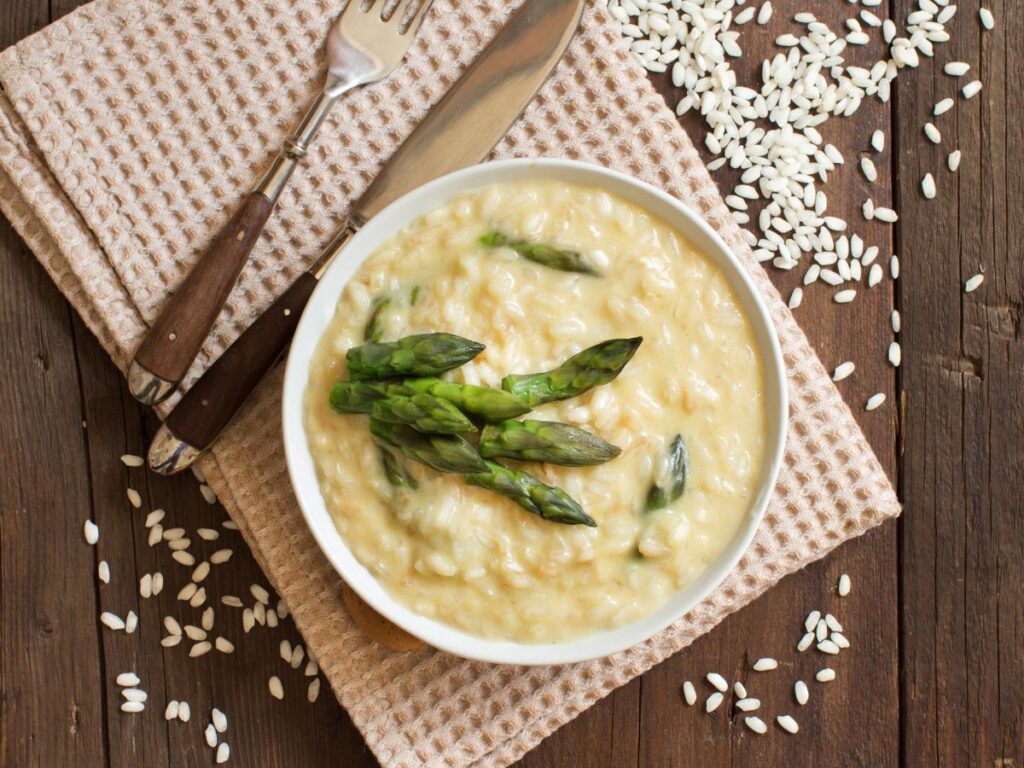
Next, we have a comforting risotto featuring creamy Arborio rice, Parmesan cheese and vibrant asparagus. This dish combines the richness of Parmesan with the freshness of seasonal vegetables for a hearty yet elegant meal.
Zucchini Parmesan Fritters
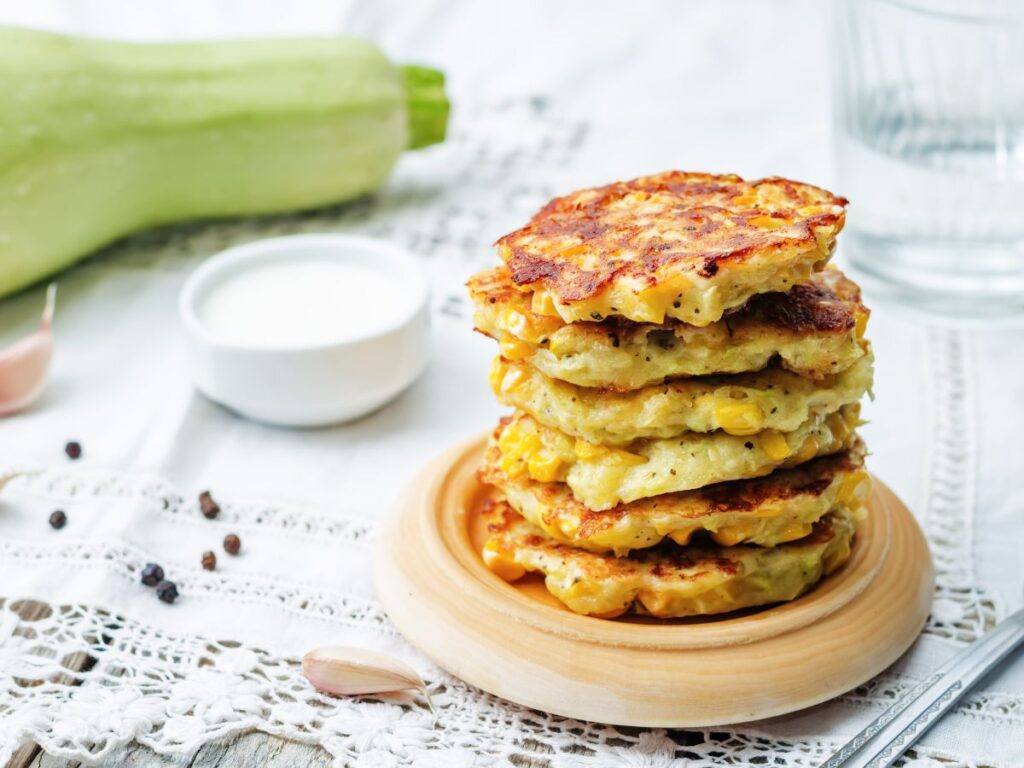
Finally, these crispy zucchini fritters are infused with Parmesan, garlic and herbs, offering a delightful way to incorporate veggies into the diet while enjoying the cheesy goodness.
Conclusion
In wrapping up our exploration of Parmesan’s role in pregnancy, it’s evident that this flavourful cheese can be a wholesome addition to expectant mothers’ diets. From bolstering protein intake to supporting bone health, Parmesan adds both taste and nutrition to the table.
Yet, the key lies in moderation, particularly due to Parmesan’s salt content. For a well-rounded pregnancy diet, balancing the enjoyment of Parmesan with an awareness of sodium intake is essential.
Embrace the versatility of Parmesan in your culinary journey, be it in a protein-rich salmon dish or nutrient-packed zucchini fritters.
To continue your exploration of pregnancy-friendly recipes and nutrition tips, stay tuned for more insights on our blog. Your journey into motherhood is unique, and we’re here to support you with valuable information and delicious culinary inspirations.
Buon appetito!
References
Safety in Pregnancy
All the advice relating to what cheeses you can eat during pregnancy in this article is based on the recommendations by health authorities in Australia, the UK and the USA. If you are unsure about what you can or cannot eat, please consult your doctor.
Australia – FSANZ, United Kingdom – NHS and United Sates of America – FDA
Nutritional content
The nutritional content of cheese in our table comes from the USDA Food Data Central Repository and cheese manufacturers. We realise that there can be variations between different brands and producers. Hence, the numbers we have used are averages.
Fat
Our fat RDI data comes from Cleveland Clinic’s Healthy Fat Intake resource.
Type of fat in cheese as per Harvard T.H. Chan’s The Nutrition Source.
Protein
Our protein RDI data comes from Harvard Medical School’s Harvard Health Publishing.
